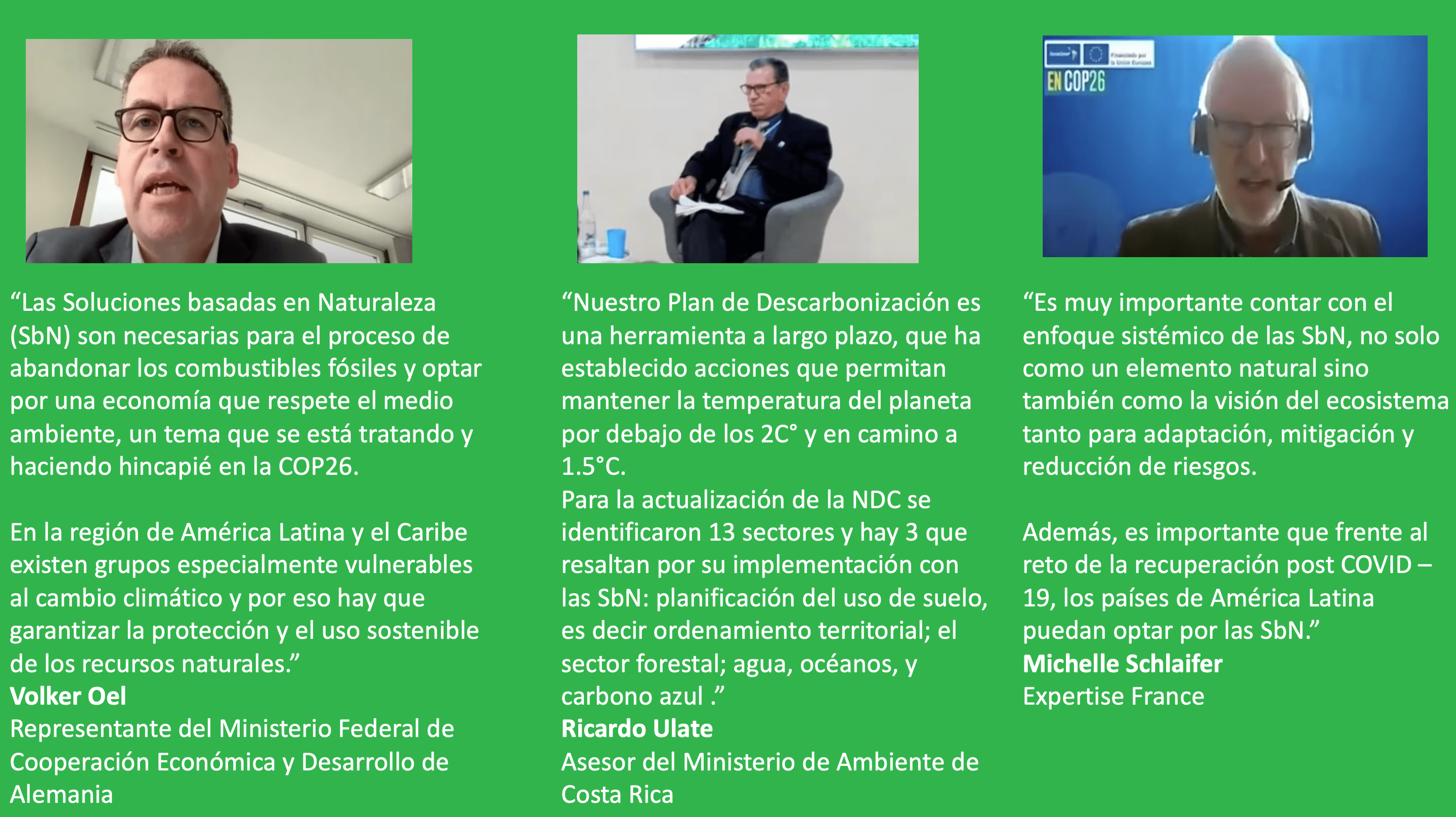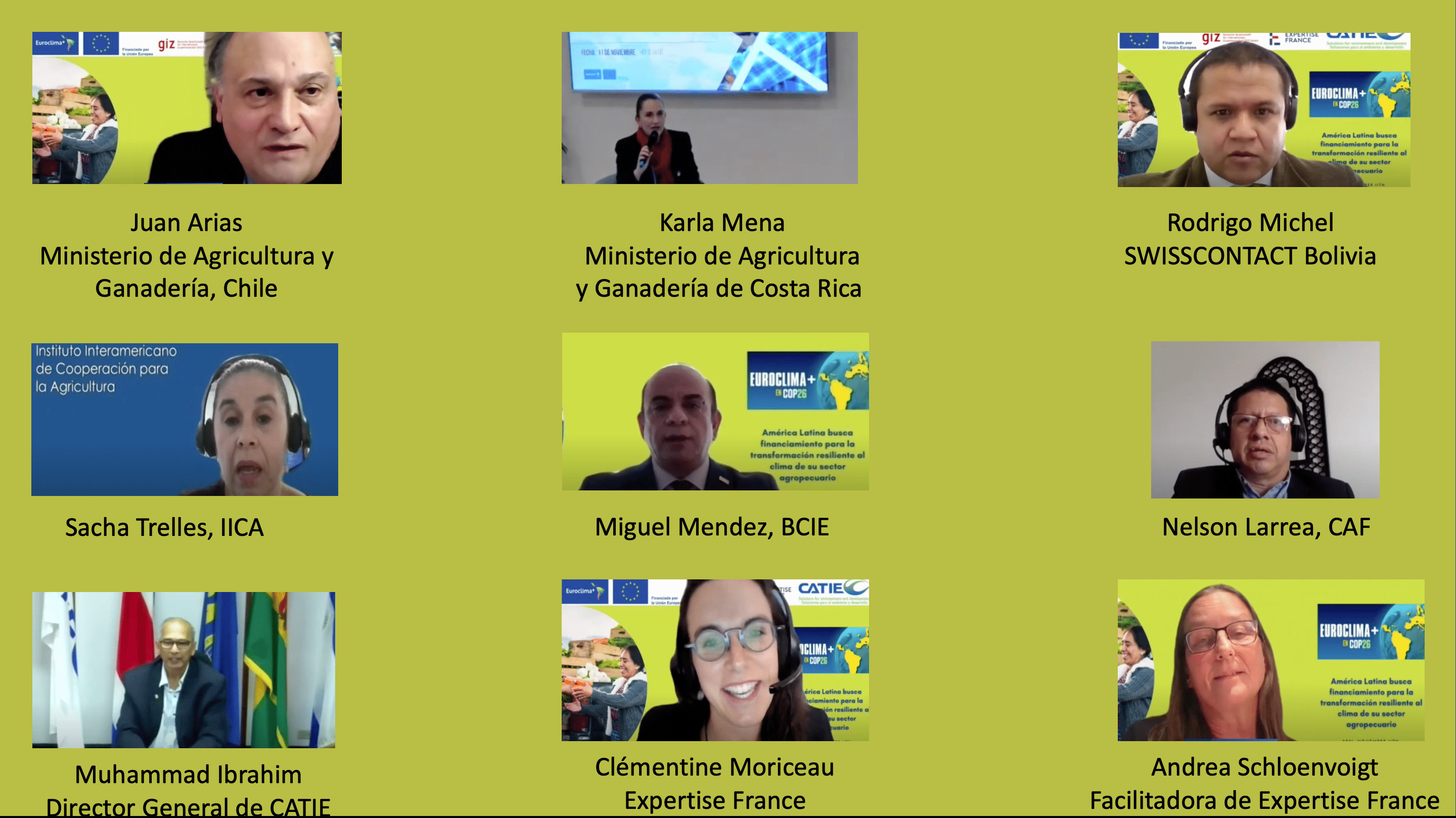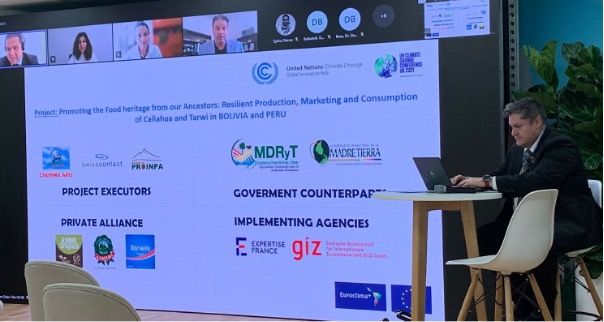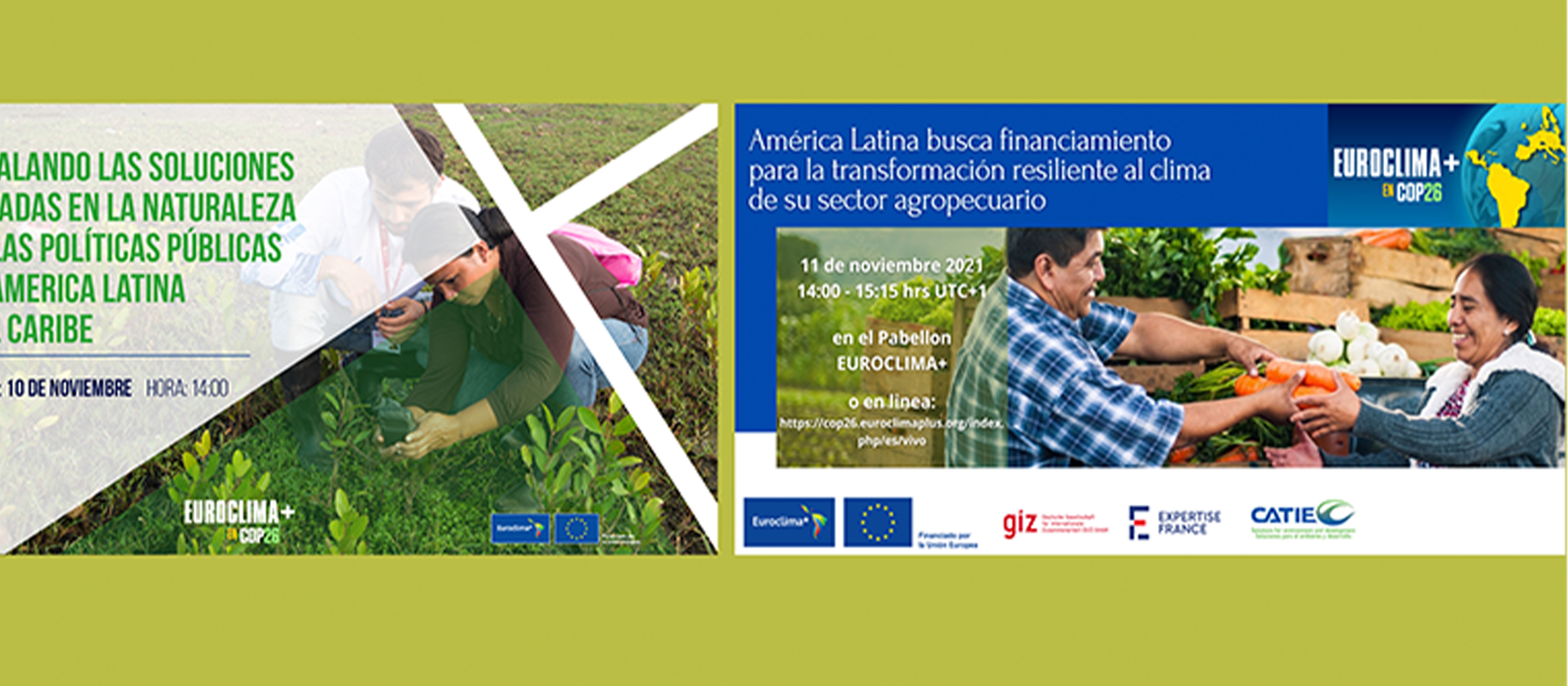Glasgow, 11 November 2021 - The Glasgow Pact gave a new impetus to efforts to reduce greenhouse gas (GHG) emissions in the short term and limit the increase in average
temperature rise by 1.5°C. Among other new developments, it recognises the importance of agriculture, forests and biodiversity in the fight against climate change.
In this regard, the EUROCLIMA+ Programme contributed with several side events that emphasised the importance of forests and ecosystems that secure livelihoods in Latin America, as well as climate-resilient and low-carbon agriculture and livestock production. EUROCLIMA+ also participated in the United Nations Global Innovation Centre on Climate Change with two sessions.
The Glasgow Pact: Now is the time to act!
The Glasgow Compact, adopted at the 26th Conference of the Parties (COP) to the United Nations Framework Convention on Climate Change (UNFCCC), held in this city from 30 October to 13 November, gave a boost to near-term GHG emission reduction efforts to limit the average temperature increase to 1.5°C, mobilise public and private climate finance and support communities for their adaptation to climate impacts. Governments and companies sought innovative partnerships to halt deforestation, accelerate restoration and incentivise a shift to sustainable agriculture and land use practices that are more attractive, accessible and affordable than conventional, unsustainable alternatives. Countries whose economies depend on agriculture and natural resources will now be able to count on more support for their transformation processes towards climate resilient economies and societies, while GHG emission reductions are still not progressing as fast as they had hoped for in the absence of stronger commitments (COP26 2021a, COP26 2021b). If these declarations are not translated into action, they could remain empty words, as has been the case with other declarations in the past, such as the 2014 New York Declaration on Forests, which has shown little progress.
The Glasgow Compact includes new commitments to sustainable and less polluting agricultural policies by twenty-six countries of the five continents. They also propose to invest in the science needed to protect a supply of food that is resilient to the effects of climate change. One example is Brazil's plan to expand its Low Carbon Agriculture programme to 72 million hectares, which could save one billion tonnes of emissions by 2030.
With this pact, for the first time, the countries have reached an agreement on phasing out coal energy. Although many countries had come to the conference with the expectation of a much stronger commitment - to discontinue this fossil energy source - the agreement means at least keeping values close to the 1.5°C target alive. The Glasgow measures are expected to keep warming to 1.8°C. However, with average emissions scenarios, the world is still on course for values close to 2.7°C. Therefore, the countries most vulnerable to the effects of climate change were disappointed about the agreement, as the climate pressure they are suffering will get worse for a longer period of time.
What was unanimous was that the governments of the countries agreed to review and strengthen their current emissions targets to 2030 no later than the end of 2022, and to contribute with tools for concerted and immediate global efforts. As a result, 90% of the world is now covered by net zero targets, whereas two years ago, only 30% of the countries had such a target (COP26 2021a).
Another issue that received more attention than in the past was addressing the loss and damage caused by current and future climate change impacts, which has provided an incentive for more vulnerable countries to accept the Glasgow Accords. However, for many of these countries, this approach is also insufficient. In this context, a commitment was agreed to significantly increase financial support through the Adaptation Fund: developed countries should double their support to developing countries for 2025.
Protect, conserve and restore nature
The commitments made at the conference will help implement the Glasgow Leaders’ Declaration on Forests and Land Use, which is now endorsed by 141 countries covering 91% of the world's forests. The Declaration aims to halt and reverse forest loss and land degradation by 2030.
This agreement, together with a strengthened Adaptation Fund and the recognition of advancing agreements on the issue of loss and damage, is crucial for transforming the agricultural sector towards climate-resilient production systems that promote food security in vulnerable countries. The necessary recognition and emphasis is given to the importance of "protecting, conserving and restoring nature" and its biodiversity to maintain the hydrological cycle, soil fertility, clean air and the diverse food base that sustains human well-being.
It is worth mentioning that this is a new action in the project, which is the resocialisation of prisoners by teaching them new production techniques for rice that is resilient to climate change and mitigates GHG emissions.
EUROCLIMA+ positions Nature-based Solutions and Agriculture at COP26
In this edition of the COP, the EUROCLIMA+ programme was present in several side events that emphasised the importance of forests and ecosystems that secure livelihoods in Latin America, as well as climate-resilient and low-carbon agriculture and livestock production.
1. Nature-based Solutions
With a focus on the importance of nature for the region's livelihoods and economy, panellists in the event "Scaling up Nature-based Solutions (NbS) in public policies of Latin America and the Caribbean" highlighted the following aspects and entry points (EUROCLIMA+ 2021b,c):
“There is a strong presence of the NbS approach in the updating of the Nationally Determined Contributions (NDCs), which are medium-term development instruments for countries. Most nations explicitly link their commitments to this approach in both their adaptation and mitigation targets. In addition, many of the commitments contribute to generating the enabling conditions for climate action through nature." Mauricio Luna, advisor to the German Society for International Cooperation (GIZ) in the EUROCLIMA+ programme.
 |
“El Salvador has very little forest cover and many degraded areas; contributing to improving this problem is one of the priorities in mitigation and adaptation, which in turn responds to the country's priorities. The development took place in the context of a participatory dialogue with the national and regional government, and with the owners of lands that were reforested. The sustainable use of resources must generate real benefits at the local level in order to be credible and profitable over time". Natalia Gonzales, coordinator of the ICCO Institute Cooperation of the EUROCLIMA+ project "Forest Value Chains".
“The communities are relying on strengthening the use of Brazil nuts and increasing income through other forest resources, which are the main measures for adaptation, mitigation, and allow valuation of the forest. We have rescued lessons learned from existing initiatives and we have also set up pilot experiences and implemented monitoring systems, which has led to the constitution of an Observatory of Amazonian Fruits and Climate Change." Luis Arteaga, coordinator of the EUROCLIMA+ Amazonian Forests and Climate Change project.

From left to right and top to bottom: Alejandra Tenorio (PRONATURA Mexico), Luis Arteaga (Amazon Conservation), roundtable of the event and Thora Amend (consultant GIZ and facilitator for the panel).
“We know that we can contribute to the NDCs reducing the vulnerability of the population by strengthening adaptive capacity with a gender and human rights approach. Through Adaptation Based on Nature (ANN) measures we reforested different areas with native species, which has reduced the risk of flooding. We have contributed to the NDCs and we can say that the actions are part of a broader strategy that contributes to national and international climate change targets." Alejandra Tenorio, coordinator in PRONATURA Mexico of the EUROCLIMA+ project "Articulating Global Agendas from the Local.
2. Financing for the agricultural sector
Latin American countries have included the agricultural sector among their national climate action priorities, not only for mitigation but also for adaptation, which is urgently needed to sustain the livelihoods of their populations.
This requires increasing the flow of climate finance by at least USD 10 billion per year exclusively for this sector from international and domestic sources, as highlighted by Muhammad Ibrahim, director general of the Tropical Agricultural Research and Higher Education Centre (CATIE), in his welcome speech at the event "Latin America seeks financing for the climate-resilient transformation of its agricultural sector", jointly organised by Expertise France, CATIE and GIZ.
The design of proposals for international climate funds requires professional training and inter-institutional articulation to develop substantial actions that will enable the implementation of sectoral policies that support the transition to low-carbon economies and resilient societies in compliance with their nationally determined contributions.
The event, moderated by Andrea Schloenvoigt, senior expert of Expertise France, brought together a high-level panel of experts, including the Ministers of Agriculture and Livestock of Costa Rica, Mr. Renato Alvarado, accompanied by Ms. Karla Mena, and from Panama, Mr. Augusto Valderrama, the Executive Director of the Plurinational Authority of Mother Earth of Bolivia, Ms. Angélica Ponce, accompanied by Mr. Rodrigo Michel of SWISSCONTACT, and the representative of the Chilean Ministry of Agriculture and Livestock, Mr. Juan Arias.
 |
Following these presentations, representatives of entities accredited by the Green Climate Fund, Ms. Sacha Trelles from the Inter-American Institute for Cooperation on Agriculture (IICA), Mr. Nelson Larrea from the Development Bank of Latin America (CAF) and Mr. Miguel Méndez from the Central American Bank for Economic Integration (CABEI), affirmed the willingness of their institutions to support the proposals and recognised the importance of close cooperation between the agencies and the national actors promoting the projects. They also shared their views on opportunities and challenges for securing sustainable finance, highlighting that there is a large gap between countries' climate finance needs and existing opportunities. Processes are often bureaucratic and there is great complexity in accessing funds, as there are different requirements, and this makes it difficult to connect needs with opportunities.
Silvia Brugger, GIZ Climate Governance Coordinator in the EUROCLIMA+ programme, explained that each agricultural sector presents its own challenges and particular characteristics, sometimes involving farmers, local producers, indigenous peoples, women, which requires different approaches to adaptation that can sometimes make it difficult to attract investment. For this reason, it is necessary to facilitate spaces for dialogue with actors in the financial sector, to listen to the experiences of entities such as IICA, CAF and BCIE, in order to learn about their requirements and opportunities for support for the structuring of projects and to be able to really close the existing gaps, she concluded.
The agriculture of Latin America in the Global Innovation Centre on Climate Change
The United Nations Global Innovation Hub on Climate Change (UGIH) was launched in November 2021, in the framework of COP26, with the aim of promoting transformative innovations for a low-emissions and climate-resilient future. The Centre expands the global innovation space by facilitating solutions that support the climate-related Sustainable Development Goals (SDGs) and address the basic human needs of food, shelter, mobility and access through alternative value chains aligned with those SDGs.
Hosted by the United Nations Framework Convention on Climate Change (UNFCCC), the Global Innovation Centre harnesses the convening power and climate leadership of the United Nations with the dynamism of the private sector. The Centre provides a global interdisciplinary community of practice with a physical-virtual space to share ideas and design climate solutions in a spirit of radical collaboration. EUROCLIMA+ also participated in the UGIH, organising two sessions focused on the agri-food sector.

Left to right: Rodrigo Michel de SWISSCONTACT in Bolivia, Pilar Galán and Claudia Cordero of GIZ/EUROCLIMA+, Stef de Hann, International Potato Centre; at the table: Carlos Ruíz-Garvia, manager of the UN Climate Change Innovation Hub.
A first session on "Climate Resilient Crops for Food Security and Future Livelihoods" brought together experts on crop biodiversity and technologies for adapting agriculture towards climate resilience, with a focus on smallholder communities. The panel was chaired by Judith Batchelar, Special Advisor on Corporate Responsibility and Sustainability (CR&S) and Public Affairs at Sainsbury plc, and included Claudia Cordero, GIZ Advisor for EUROCLIMA+, Aaron Davis, of the Royal Botanic Gardens of Kew, London, Dr. Sandra Knapp of the National History Museum of London and Dr. Richard Randle-Boggis, University of Sheffield (UNFCCC 2021).
EUROCLIMA+ shared the experience of the regional project “Potato, Family and Climate” ("Biodiversity and best practices in climate-smart agriculture to improve the resilience and productivity of family farming in Andean potato-based food systems") and how the methodologies applied can be replicated in different contexts and crops to promote climate-smart agriculture transformations. The project, co-funded by EUROCLIMA+ and implemented by the International Potato Center and the Inter-American Institute for Cooperation on Agriculture in three countries of the Andean region (Bolivia, Ecuador and Peru), between 2019 and 2021, analysed the productive conditions of potato crops in the context of climate change in the Andean highlands, applying the Cool Farmer Tool for on-farm decisions that should increase the resilience of potato-based agri-food systems.
The transition to climate-smart agriculture in these countries needs to identify the agents of change in the climate, agriculture and food sectors. Farmers are key actors as on-farm measures can serve a triple function: reducing the impacts of climate change, transforming agri-food systems, and improving the livelihoods of rural populations.
During the session "Basic nutrition and health needs in the Andean region", the health crisis was discussed and the importance of innovation in agri-food systems to improve the health and nutrition conditions of a growing population, which is expected to reach 10 billion people by 2050, was highlighted. In this context, two experiences of EUROCLIMA+ programme projects in the Resilient Food Production sector were presented: “Promoting the heritage of our ancestors: production, marketing and consumption of Cañahua and Tarwi", and "Potato, Family and Climate".
In the Andean region, the EUROCLIMA+ programme supports projects to improve agri-food systems based on these ancestral crops through climate-smart agricultural practices, which are essential in the diet of the population and a source of agricultural income. These experiences provide alternatives, on the one hand, to reduce greenhouse gas emissions in agriculture and, on the other hand, to innovate production and marketing systems, increasing a diversified production of nutritious and healthy foods, accessing new differentiated markets and promoting conscious consumption, while protecting agrobiodiversity.
The examples presented at COP26 underscore the importance of climate action in the agricultural sector to ensure human well-being in Latin America. The high dependence of this sector on healthy and functional ecosystems is not in doubt. The fact that more than 130 countries are already committed to halting forest deforestation by 2030 is a key milestone, and not just for the economies of the most vulnerable countries.
Conclusions about agriculture in Glasgow
COP26 concluded with relevant achievements for sustainable agriculture and other land uses (COP26 2021b):
- 45 governments pledge urgent actions and investments to protect nature and shift to sustainable forms of agriculture.
- 95 high-profile companies from a variety of sectors pledge to be "nature positive", and agreed to work to halt and reverse nature's decline by 2030.
During his closing speech, COP26 President Alok Sharma summed up the importance of the sector:
"If we are to limit global warming and keep the 1.5°C target alive, then the world needs to use the earth sustainably and put the protection and restoration of nature at the heart of everything we do.”
Today's commitments show that nature and land use are being recognised as essential to meeting the goals of the Paris Agreement and will contribute to addressing the twin crises of climate change and biodiversity loss.
The World Bank will commit to spend USD 25 billion on climate finance annually until 2025 through its Climate Action Plan, which includes a focus on agriculture and food systems.
In a similar show of commitment from the private sector, nearly 100 high-profile companies from a variety of sectors pledged to become "Nature Positive". Commitments include supermarkets pledging to reduce their environmental impact on climate and nature loss, and fashion brands ensuring the traceability of their materials.
Representatives from indigenous and local communities will participate in events throughout the nature day. As stewards of 80% of the world's remaining biodiversity, Indigenous Peoples are leaders in how to develop nature-based, resilient and effective solutions to climate change".
Sources of information:
- COP26 2021a. COP26 keeps 1.5oC alive and finalizes Paris Agreement
- COP26 2021b. Nations and businesses commit to create sustainable agriculture and land use
- Glasgow Leaders’ Statement on Forests and Land Use
- EUROCLIMA+ 2021b. News: Scaling-up Nature-based Solutions in public polícies of Latin America and the Caribbean
- UNFCCC 2021. UN Climate Change Global Innovation Hub
Videos:
|
|
|
Contacts:
- This email address is being protected from spambots. You need JavaScript enabled to view it.
- This email address is being protected from spambots. You need JavaScript enabled to view it.



